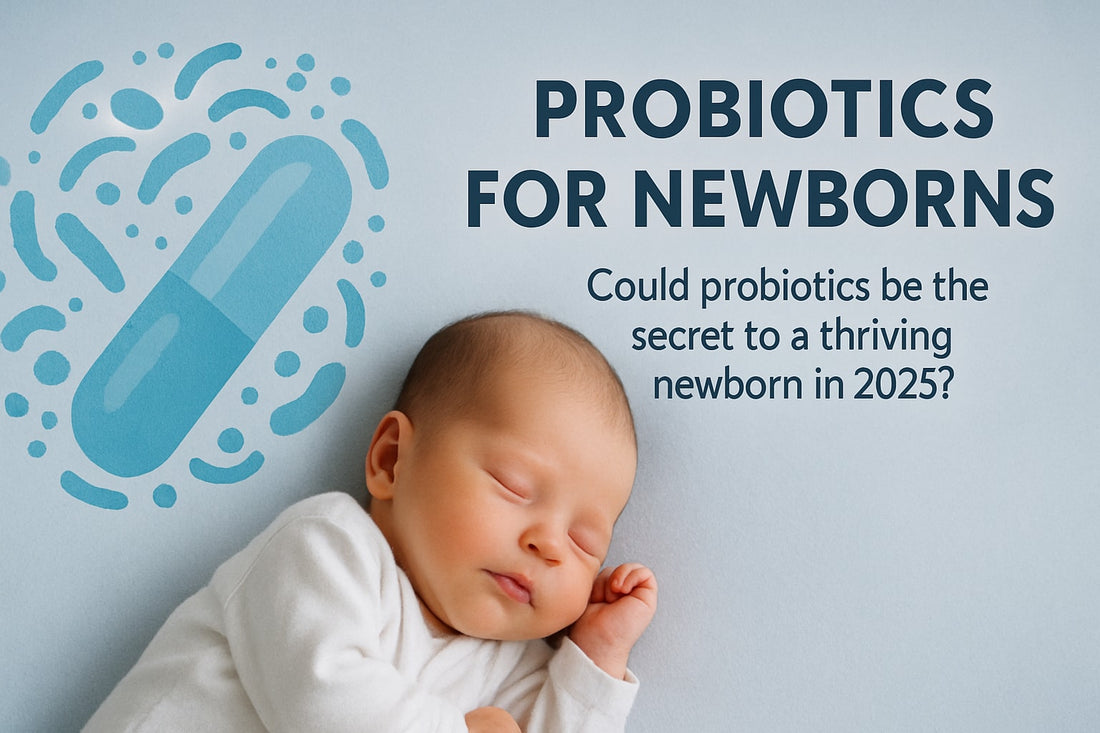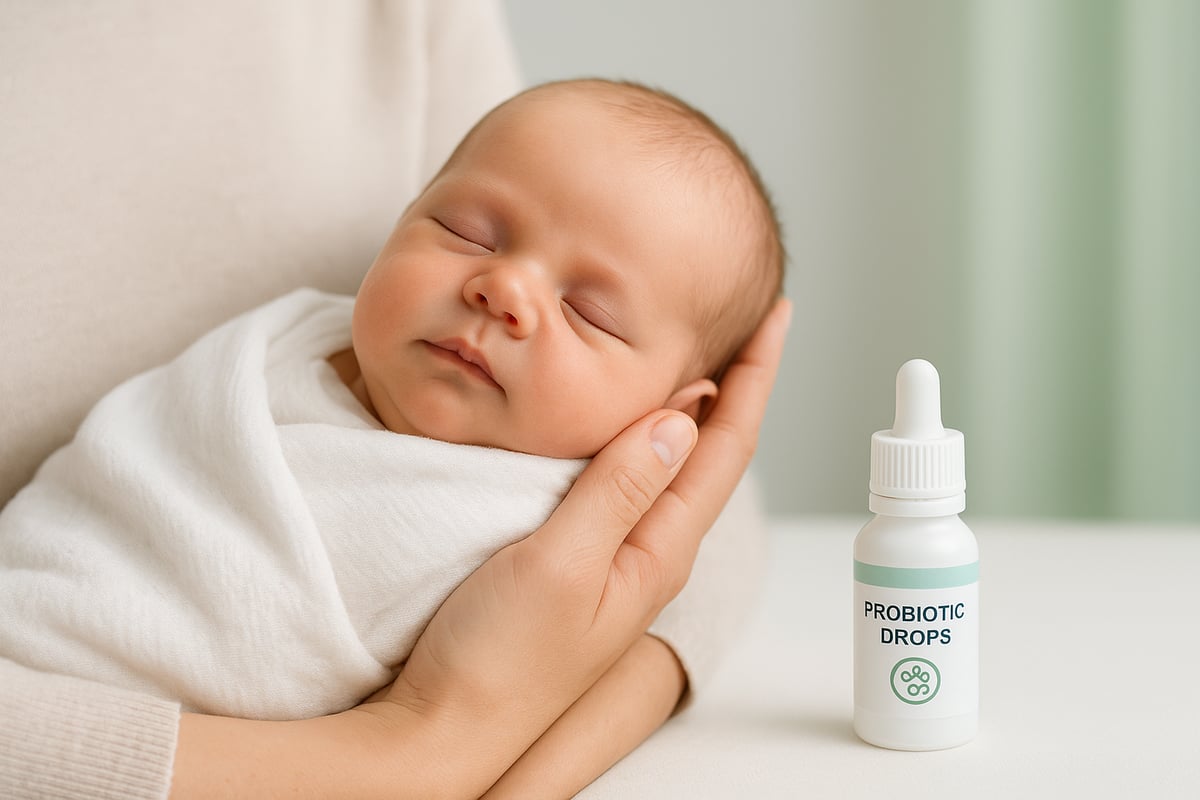
Probiotics for Newborns: The Essential Guide for Parents 2025
Share
As a new parent, you want to give your baby the healthiest start possible. Could probiotics for newborns be the secret to a thriving infant in 2025? Parents everywhere are asking more questions about gut health and the role of beneficial bacteria in early development.
With growing curiosity, many are eager to discover how probiotics for newborns might support immunity and digestion from the very first days of life. This article provides a science-backed, easy-to-understand guide designed for parents seeking trustworthy answers.
You will learn what probiotics are, how they benefit newborn health, the best ways to use them safely, and which questions to ask your pediatrician. Read on for everything you need to know about probiotics for newborns in 2025.
What Are Probiotics and Why Do They Matter for Newborns?
Understanding probiotics for newborns starts with a look at what probiotics are and why they are essential in the early days of life. Parents are becoming increasingly curious about how these tiny organisms can influence their baby’s health from the very start.
Defining Probiotics and Their Role in the Body
Probiotics for newborns are live beneficial bacteria that help build a healthy gut microbiome from birth. Unlike prebiotics, which feed good bacteria, probiotics are the actual living microorganisms that add to the population of healthy microbes.
The gut microbiome is a complex ecosystem of bacteria, yeast, and other microbes that starts developing immediately after birth. This community is not just about digestion, but also influences a baby's immune system and overall well-being. For example, Bifidobacterium and Lactobacillus strains are commonly found in healthy infants and are widely researched for their roles in supporting digestion and immune balance.
As research on the gut-brain axis grows, more parents are interested in how gut health and mental well-being are connected, especially from the earliest stages of life. Probiotics for newborns offer a way to support this foundational system right from the start.
Unique Needs of Newborns’ Digestive Systems
At birth, a newborn's gut is essentially sterile. The colonization of the gut with bacteria begins immediately, influenced by factors like delivery method, feeding choices, and the surrounding environment. Babies born by C-section have a 30 percent higher risk of imbalanced gut flora compared to those born vaginally, which may affect their immune and digestive development.
Key factors influencing the gut microbiome in newborns include:
- Delivery method (vaginal or C-section)
- Breastfeeding versus formula feeding
- Exposure to antibiotics or hospital environments
Establishing a healthy microbial balance early is critical for lifelong health. Probiotics for newborns can help support this process, especially in babies who face challenges like C-section delivery or early antibiotic use.
Why Probiotics Are Gaining Attention in 2025
In 2025, more parents are turning to probiotics for newborns because of rising concerns about allergies, colic, and digestive discomfort in infants. Recent studies have linked early gut health to stronger immune development and reduced allergy risk, making probiotics an appealing option for proactive parents.
Pediatricians are increasingly recommending probiotics for newborns, especially for those with a history of digestive upsets or who are at higher risk due to delivery or feeding factors. Many families are now sharing stories of fewer colic episodes after starting probiotic supplements, highlighting the real-world impact of these beneficial bacteria.
As research continues to unfold, probiotics for newborns remain at the forefront of infant health strategies for families seeking the best possible start for their children.
Proven Benefits of Probiotics for Newborns
As research rapidly advances, more parents are asking how probiotics for newborns might shape their child’s health. Let’s explore the science-backed benefits in detail, from easing colic to supporting lifelong wellness.

Digestive Health and Colic Relief
Digestive discomfort is one of the most common concerns for new parents. Studies show probiotics for newborns can significantly reduce colic symptoms. A 2022 meta-analysis reported a 48% decrease in daily crying time for infants who received certain probiotic strains.
How do they work? Probiotics help balance gut bacteria, easing gas, bloating, and diarrhea. For example, breastfed babies given Lactobacillus reuteri experienced notable improvement in colic within four weeks. These findings are echoed in recent ESPGHAN Probiotic Recommendations for Children, which highlight specific strains shown to support infant digestive health.
Immune System Support
The foundation of a strong immune system begins in the gut. Early exposure to probiotics for newborns has been linked to a lower risk of eczema and allergies, with some studies showing a 20% reduction in occurrence.
Probiotics strengthen the gut barrier and help regulate immune responses. There is also evidence that infants supplemented with certain strains have fewer respiratory infections in their first year. This immune support is particularly important for families with a history of allergies.
Antibiotic Recovery and Protection
Newborns sometimes require antibiotics for infections, but these treatments can disrupt delicate gut flora. Probiotics for newborns play a vital role in restoring balance after antibiotic use.
Research suggests they can lower the chance of antibiotic-associated diarrhea by as much as 60%. This benefit is especially critical for infants in the NICU, where maintaining healthy gut flora can support overall recovery and reduce complications.
Long-term Health Outcomes
Emerging research is investigating how early gut health influences lifelong wellness. Children with balanced gut flora from infancy may have lower rates of obesity and metabolic syndrome as they grow.
There is also growing interest in how probiotics for newborns might support mood and cognitive development, though this area is still being explored. Promoting microbial balance early in life sets the stage for healthy growth and development.
Limitations and Controversies
While the benefits are promising, it is important to recognize that not all studies show equal results. The effects of probiotics for newborns are often strain-specific, and what works for one baby may not work for another.
Some experts caution against routine supplementation without medical guidance. Parents should always consult their pediatrician before starting any new supplement and rely on products backed by clinical research.
When and How to Introduce Probiotics to Your Newborn
Introducing probiotics for newborns can feel overwhelming, but with the right guidance, parents can make informed choices. Understanding when and how to incorporate these supplements is key to supporting your baby's gut health from the start.

Signs Your Baby Might Benefit from Probiotics
Not all infants need probiotics for newborns, but certain situations can make supplementation especially helpful.
Common signs include:
- Persistent colic or excessive crying
- Frequent digestive upsets like gas, bloating, or diarrhea
- History of C-section delivery or formula feeding
- Recent antibiotic use, which may disrupt gut balance
- Family history of allergies or eczema
If your baby shows any of these signs, discussing probiotics for newborns with your pediatrician may be worthwhile. Early intervention can help restore microbial balance and support overall well-being.
Types of Probiotic Products for Newborns
Parents can choose from several forms of probiotics for newborns, including drops, powders, and specially formulated infant formulas. The most common strains for infants are Bifidobacterium infantis, L. reuteri, and L. rhamnosus GG, known for their safety and efficacy.
When selecting a product, look for those designed for infants, such as Tiny Tummy Probiotic Boost, which is tailored to gentle digestion. Always check for third-party testing and clinical research supporting the product's claims.
Step-by-Step Guide to Introducing Probiotics
To safely add probiotics for newborns to your baby's routine, follow these steps:
- Consult your pediatrician before starting any supplement.
- Choose a reputable, age-appropriate probiotic product.
- Begin with a low dose to monitor for any adverse reactions.
- Administer the probiotic daily at the same time for consistency.
- Track your baby's digestion, mood, and sleep for changes.
This gradual approach ensures your baby's system adjusts smoothly and allows you to spot any concerns early.
Dosage and Duration
The recommended dosage of probiotics for newborns typically ranges from 1 to 10 billion CFU per day, depending on the strain and product. Manufacturers and clinical trials often specify these guidelines.
For acute digestive issues, a course of 2 to 4 weeks is common. For ongoing support, your pediatrician may recommend longer use. Always follow professional advice and observe your baby's response to ensure optimal safety and effectiveness.
Safety, Risks, and Precautions for Probiotics in Newborns
Providing your baby with the best start means carefully considering every supplement, including probiotics for newborns. While the benefits are promising, understanding the safety, risks, and precautions is vital before introducing any new product into your baby's routine.
Are Probiotics Safe for All Newborns?
Most research indicates that probiotics for newborns are generally safe when used in healthy, full-term infants. However, babies born prematurely, with weakened immune systems, or underlying health issues may face higher risks. Regulatory bodies like the FDA and EFSA emphasize the need for clinically tested products and transparent labeling. For more on science-backed safety guidelines, see the EFSA-approved health claims for probiotics and supplements.
Possible Side Effects and How to Monitor
When starting probiotics for newborns, mild side effects such as gas or loose stools can occur. These symptoms are usually temporary and resolve on their own. Rarely, severe complications like sepsis have been reported, especially in extremely premature infants. Parents should monitor for any unusual reactions, including persistent digestive issues or allergic responses, and consult a pediatrician if symptoms persist.
Guidelines for Choosing Safe Probiotic Products
Choosing the right probiotics for newborns involves careful evaluation. Look for:
- Products with third-party testing and clinical research
- Clearly labeled strains and CFU count appropriate for infants
- Allergen-free and additive-free formulations
- Proper storage instructions to ensure live cultures remain effective
Reading labels and understanding ingredient lists help ensure you make informed, safe choices.
When to Avoid or Discontinue Use
Not all infants are suitable candidates for probiotics for newborns, particularly those with severe immune disorders or chronic illnesses. If your child develops signs of an allergic reaction, persistent digestive distress, or other concerning symptoms, discontinue use immediately and seek medical advice. Always consult your pediatrician before restarting or trying a different supplement.
Questions to Ask Your Pediatrician
Before starting probiotics for newborns, prepare a list of questions for your doctor. Ask which strains and brands are best supported by evidence, whether probiotics are suitable for your baby's specific needs, and how to monitor for side effects. Open communication ensures you make the safest decision for your newborn's health.
What Parents Should Look for in a Probiotic Supplement (2025 Edition)
Choosing the right probiotics for newborns is essential for your baby's health and comfort. With so many options on the market, understanding what matters most can help you make confident, informed decisions.
Key Criteria for Selecting a Newborn Probiotic
When evaluating probiotics for newborns, focus on these essential features:
- Strain specificity: Not all probiotics for newborns are created equal. Look for products listing exact strains such as Bifidobacterium infantis or Lactobacillus reuteri.
- CFU count: The colony-forming units (CFU) should be appropriate for infants, usually between 1 and 10 billion per dose.
- Clinical research: Select supplements supported by published studies in newborn populations.
- Allergen-free and clean label: Choose probiotics for newborns that avoid common allergens, fillers, and artificial ingredients.
- Packaging: Opt for packaging that maintains potency and shelf life, like dark glass bottles or special blister packs.
Always review these factors before bringing probiotics for newborns into your home.
Understanding Labels and Marketing Claims
Reading supplement labels can be challenging. Pay close attention to:
- Full strain names (e.g., L. rhamnosus GG, not just "Lactobacillus blend").
- Ingredient transparency: Every component should be clearly listed.
- Expiration dates: Freshness is crucial for live cultures.
- Storage instructions: Some probiotics for newborns require refrigeration.
- Be wary of vague marketing like “clinically proven” without references.
By understanding labels, you can avoid misleading claims and ensure the probiotics for newborns you select are safe and effective.
Trends in Probiotic Supplementation for 2025
The landscape for probiotics for newborns is rapidly advancing. Look for:
- Synbiotics: Blends of probiotics and prebiotics to support gut health.
- New delivery technologies: Improved survivability of strains through the digestive tract.
- Plant-based and sustainable formulations: Meeting the demand for gentle, eco-conscious options.
These trends highlight the evolving science behind probiotics for newborns and offer more tailored choices for families.
Trusted Probiotic Brands and Where to Buy Them
Selecting trusted brands is vital when choosing probiotics for newborns. Reputable companies provide third-party testing, clinical evidence, and transparent labeling. For example, Essential Life offers plant-based, wholefood probiotics for newborns, designed for sensitive digestion and free from common allergens.

Parents can find these products online, at pharmacies, or in specialty wellness shops. Always verify that any probiotics for newborns you purchase are suitable for infants and meet the highest safety standards.
Red Flags: What to Avoid
Be cautious of the following warning signs when shopping for probiotics for newborns:
- Missing strain information or vague “probiotic blend” claims.
- Added sugars, artificial colors, or unnecessary fillers.
- Lack of third-party testing or clinical support.
- Promises of “miracle cures” without scientific backing.
Choosing wisely ensures your baby's probiotic supplement is both safe and effective.
Talking to Your Pediatrician: Making the Best Choice for Your Baby
Navigating the world of probiotics for newborns can feel overwhelming. Consulting your pediatrician is the best way to ensure your choices are safe, effective, and tailored to your baby’s unique needs. Open communication with your healthcare provider helps you make informed decisions that support your child’s health and development.
Why Professional Guidance Matters
Pediatricians play a crucial role in helping parents understand probiotics for newborns. They assess your child's medical history, risk factors, and family background to determine if supplementation is appropriate.
Professional organizations like the American Academy of Pediatrics and ESPGHAN regularly update their guidelines on infant probiotic use. Your doctor can interpret these recommendations, ensuring your baby receives only what is necessary and beneficial.
Prepare for your visit by writing down questions about probiotics for newborns and gathering any relevant health information. This approach ensures your concerns are addressed and helps your pediatrician provide the most up-to-date advice.
Customizing Probiotic Use for Your Baby
Every baby is unique, and so are their digestive and immune needs. Pediatricians can help you select the most suitable strains and dosages of probiotics for newborns based on specific concerns such as colic, recent antibiotic use, or a family history of allergies.
Together, you can develop a plan to monitor your baby's response. Keep a simple log of symptoms, feeding patterns, and any changes in mood or sleep. This documentation allows for timely adjustments, ensuring the right balance is achieved for optimal results.
Integrating Probiotics with Other Infant Care Practices
Probiotics for newborns work best when combined with a holistic approach to infant care. Breastfeeding, when possible, naturally supports healthy gut flora. If formula feeding, your pediatrician may suggest a product enriched with probiotics or prebiotics.
Introducing solid foods at the right time and maintaining good hygiene also play key roles in gut health. Discuss with your pediatrician how all these practices can work together to maximize the benefits of probiotics for newborns.
Staying Updated on New Research
The field of probiotics for newborns is rapidly evolving. New studies shed light on safety, effectiveness, and best practices. It is important to rely on credible sources, such as the NHS, CDC, or reputable pediatric journals.
For example, recent updates on probiotic use in NICUs highlight ongoing safety monitoring and evolving recommendations from experts. Staying informed ensures your decisions are based on the latest scientific evidence.
Empowering Parents to Make Informed Decisions
Ultimately, your voice matters most in your baby's care. Balance clinical evidence with real-world experiences, but always prioritize safety. Know when probiotics for newborns are truly beneficial and when they may not be necessary.
By working closely with your pediatrician, you can confidently navigate the choices available and provide the healthiest start for your child.
As you explore the science and practical steps of supporting your newborn’s gut health, it’s clear that what you choose for your baby matters. Giving your little one a gentle, plant-based start can make all the difference for their digestion, immunity, and long-term wellbeing. If you’re ready to take the next step in providing clean, effective nourishment for your family, I invite you to join the clean supplement movement your wellness boost awaits. Together, we can embrace a more natural path to health—one that helps you and your baby thrive, every day.
